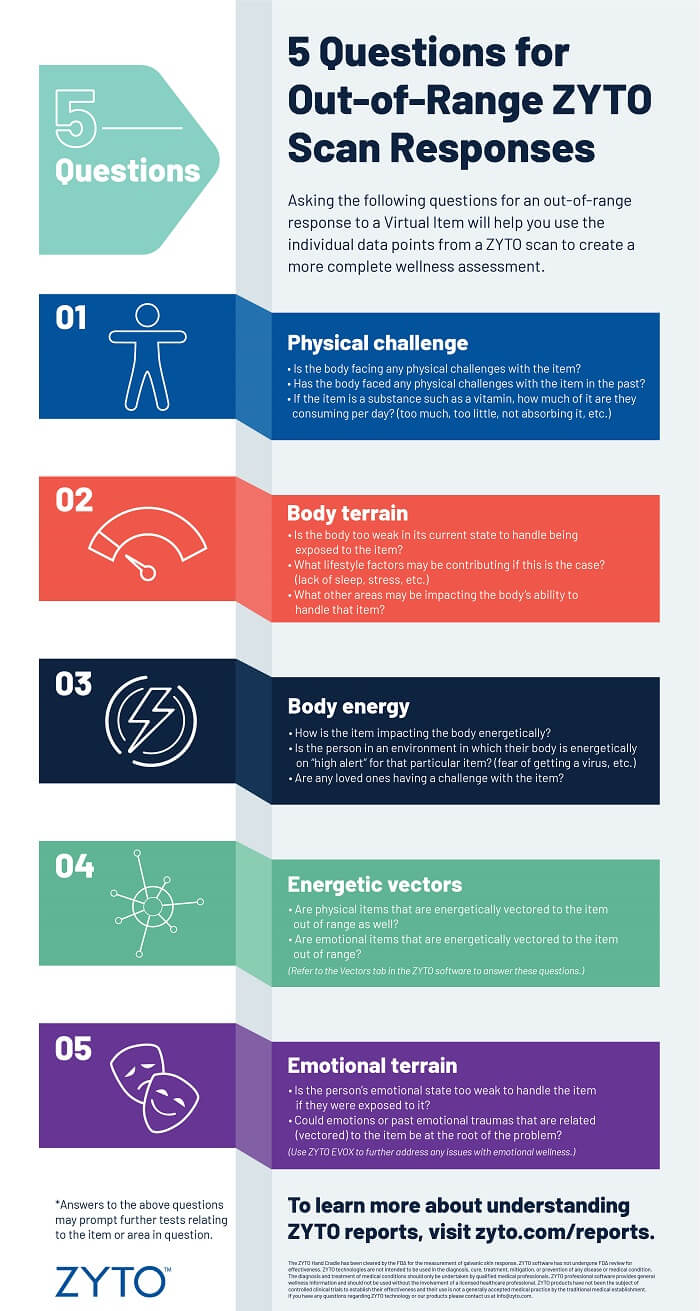ZYTO technology is not diagnostic, but is designed to help you ask better, more relevant questions related to a person’s wellness. With this technology, one key area to consider in relation to a person’s wellness is which Virtual Items appear as out of range on the ZYTO report.
Looking at one out-of-range Virtual Item can lead to a number of helpful answers to your questions. However, it’s important to consider all the data points of any ZYTO biosurvey along with your unique expertise to best assist a client. Considering the following 5 questions for any out-of-range response will help you use individual data points to create a more complete wellness assessment.
1 – Is the body facing a physical challenge?
If a Virtual Item shows up as out of range on the report, you may want to first ask the client if they’re dealing with any physical challenges with the item that the Virtual Item is associated with. If the Virtual Item is an organ, you could ask if the client has any problems with that organ or if they have had problems with it in the past. Or if it’s a tooth, do they have any sensitivity or have they had any work done on that tooth?
If the Virtual Item in question is an environmental item and the item it is associated with could be present in the body, you can ask similar questions as well. For example, if it’s a heavy metal, you could ask if they have been tested for heavy metals or if they have symptoms of excessive heavy metals. This could prompt a recommendation to get a test of heavy metals to investigate further.
Similarly, if a vitamin or mineral Virtual Item is out of range, you could ask how much of that vitamin they are getting per day to see if they may be getting too much or too little. This could also prompt a test to measure vitamin and mineral levels in the body.
2 – Is the terrain of the body unable to handle a potential challenge?

After asking any relevant questions related to the physical body, you should dive deeper by asking questions about the body’s terrain. Terrain has to do with the body’s ability to handle a stressor if it were introduced to the body. In other words, the body may be too weak in its current state to handle being exposed to the stressor.
If, for example, you’re looking at the Virtual Item associated with bacteria, you may ask about what may be happening in the client’s life and see whether that could be impacting their immune system. Are they getting enough sleep? Are they stressed out? These are things that can affect immunity and therefore the terrain’s ability to deal with bacteria.
In summary, asking questions about the terrain of the body helps you consider other areas that may impact the body’s ability to handle a particular stressor.
3 – Is the response related to the body’s energy?
Energy can play an important role in how the body handles and deals with stress. Thus, asking questions about how a potential stressor may be impacting the body energetically can be incredibly helpful.
To illustrate the impact of energy, let’s say that the Virtual Item associated with virus is out of range. A good question to ask in this scenario could be, “Are you in an environment in which you are energetically on high alert for that particular item?” For example, you may be a nurse and so you have to be vigilant every day in protecting yourself from germs and it is constantly on your mind.
Energy is not only related to ourselves. Other people’s energy can impact us as well. We may be carrying the baggage of someone else’s stress, which can make it more difficult to handle certain stressors in our lives. A good question here to learn about how another person’s energy may be impacting the client would be, “Have any family members had a challenge with the item that this Virtual item represents?”
4 – Are energetically vectored items dealing with a challenge?

Vector associations are also important to consider when asking questions about out-of-range Virtual Items. A vector is a part of the body that is energetically connected to other parts of the body. In traditional Chinese medicine, for example, the liver is considered to be closely connected to the first cervical vertebra and 4th, 5th, and 8th thoracic vertebrae. It’s also considered to be energetically connected to the 4 canine teeth.
Looking at vectors related to an out-of-range item is valuable because it allows you to consider other areas that may be impacting the item in question. If the Virtual item for liver is out of range, you could ask if the client is experiencing any issues with the specific vertebrae or tooth it is vectored to.
In addition to being understood to be vectored to other physical parts of the body, physical items may also be vectored to certain emotions. It is understood in traditional Chinese medicine that the liver, for example, is strongly connected with anger. So if you are looking at a liver Virtual item that’s out of range, you may want to ask the client about any anger they may have or experience. If all or most of the vectors are out of range, that is a much better set of data to work from rather than just considering one biomarker.
5 – Is the emotional terrain facing a challenge?
Similar to physical terrain, emotional terrain deals with our ability to handle a stressor if it were introduced to the body. Emotional terrain is important because if certain emotions linger and don’t get cleared up, they can easily lead to physical issues.
Going back to the liver example, excessive and prolonged anger may eventually lead to a physical issue with the liver. So for any physical Virtual Items you are looking at, you should also ask questions about emotions that may be influencing items.
In addition to asking questions about out-of-range emotions on a ZYTO biosurvey, ZYTO EVOX perception reframing can be particularly valuable in addressing the client’s emotional wellness.
Have additional questions about ZYTO reports?
If you have other questions about understanding ZYTO reports, check out the Understanding ZYTO Reports page.
 About Vaughn R CookDr. Vaughn R Cook is the Founder & CEO of ZYTO. An Oriental Medical Doctor (OMD) and licensed acupuncturist, he has worked in the complementary and alternative medical field for more than 30 years, specializing in applications that integrate Western and Eastern medicine.
About Vaughn R CookDr. Vaughn R Cook is the Founder & CEO of ZYTO. An Oriental Medical Doctor (OMD) and licensed acupuncturist, he has worked in the complementary and alternative medical field for more than 30 years, specializing in applications that integrate Western and Eastern medicine.
Disclaimer:
The ZYTO Hand Cradle has been cleared by the FDA for the measurement of galvanic skin response. ZYTO software has not undergone FDA review for effectiveness. ZYTO technologies are not intended to be used in the diagnosis, cure, treatment, mitigation, or prevention of any disease or medical condition. The diagnosis and treatment of medical conditions should only be undertaken by qualified medical professionals. ZYTO professional software provides general wellness information and should not be used without the involvement of a licensed healthcare professional. ZYTO products have not been the subject of controlled clinical trials to establish their effectiveness and their use is not a generally accepted medical practice by the traditional medical establishment. If you have any questions regarding ZYTO technology or our products please contact us at info@zyto.com.
